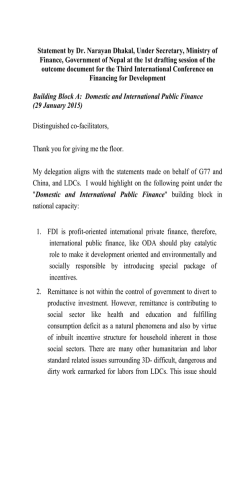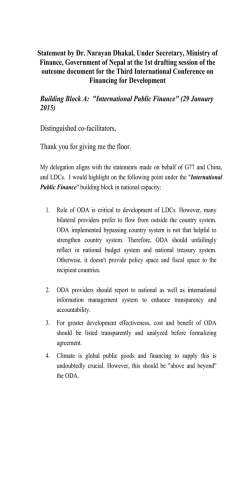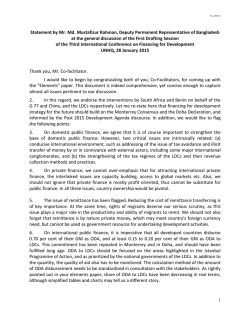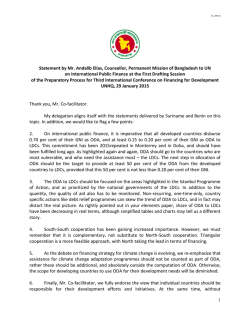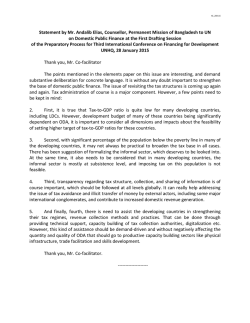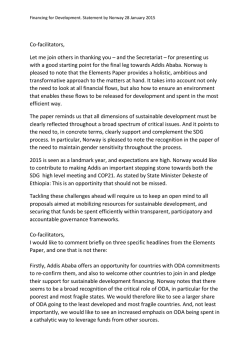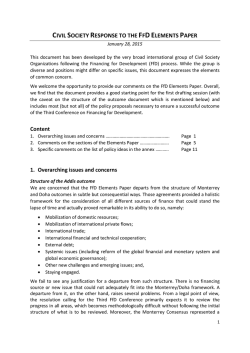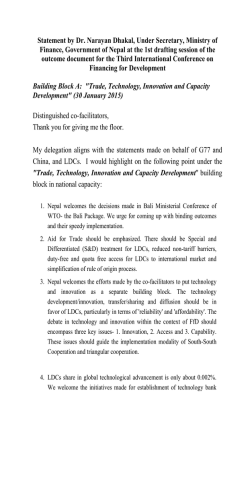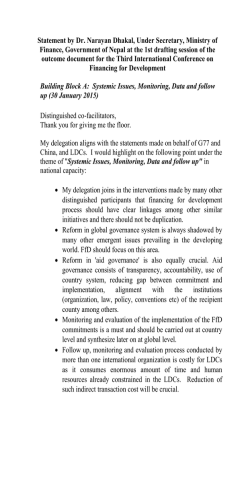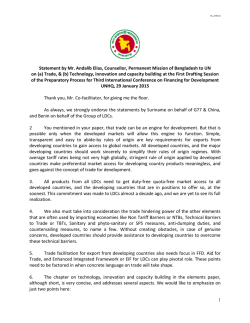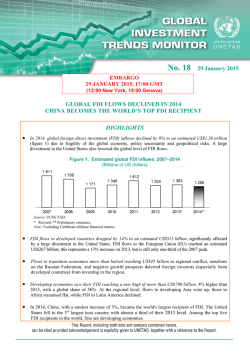
Nepal
Statement delivered by Dr. Narayan Dhakal, Under Secretary, Ministry of Finance, Government of Nepal at the 1st drafting session of the outcome document for the Third International Conference on Financing for Development UN Headquarters, New York, 28 January 2015 28 January, Morning Session Distinguished co-facilitators, Thank you for giving me the floor. My delegation appreciates your efforts to come up with such a comprehensive and well-referenced elements document having wide coverage. My delegation aligns with the statements made on behalf of G77 and China, LDCs, and LLDCs. I am pleased to register following general comments on elements document in national capacity. Detail I will intervene from the relevant sessions of each of the building blocks as we go during next two days: 1. I would like to draw your kind attention to paragraph- 43 of Monterrey Consensus which is dedicated to the quality of ODA surrounding country ownership, harmonization, alignment, result concern, transparency and accountability, and South-south cooperation etc. Afterwards, many initiatives have taken place- for example, Rome Declaration, 2003, Paris Declaration, 2005, Accra Agenda for Action, 2008, Busan Outcome Document for Development Partnership, 2011 and Global Partnership for Effective Development Cooperation, 2014. 2. All these initiatives were grounded on the Monterrey promises. As I could not find any mentions about these efforts, I would suggest to make due reference of these efforts to carry on the spirit of the Monterrey Consensus and to avoid missing link in the long chain of global partnership. 3. Tax is definitely a sustainable source of development financing. Capacity development of revenue administration is crucial to protect erosion of tax base. However, scaled-up investment in the economy is equally essential for widening the tax base that results in increased tax collection. 1 4. Requests by development partners for exemption of income tax in ODA funded projects is one of the major challenges in protecting tax base in developing countries. The 3rd conference on FfD should explicitly persuade the ODA providers to make their implementing agencies, partner organizations and contractors fully comply with domestic tax laws of the developing countries; pay income tax in source country; and claim tax credit from their resident country where they file their tax return. The conference should also encourage formalizing tax treaty between the countries participating in fund-flow for development, investment and business and from remittance for avoidance of double taxation and tax evasion. 5. Private sector is not primarily concerned for development unlike public sector. Foreign Direct Investment is found to be targeted at commodity and extractive industries. Despite being profit-oriented, private finance could be important source for development if attracted to productive investment and can enhance sustainable development. 6. Flow of remittance is increasing as domestic private sector but not within the control of government to divert to productive investment. However, it cannot be ignored that remittance is being invested indirectly in social sector like health and education, which is also because of benefit of education and health at household level. Remittance should be used as complimentary NOT competitor to ODA. However, reducing transfer cost and using formal banking channel for transfer of remittance would definitely help account and realize 'value for money'. 7. According to the World Bank, nearly 389 billion USD has flown worldwide to developing countries in 2012 overtaking the volume of ODA and following the FDI. An OECD review of remittance related literatures indicates that it may not always be appropriate to assimilate remittances to development finance as it has both positive and negative effects on economy and lack a clear developmental intention. Negative in a sense it may create "Dutch disease" effects by increasing consumption of non-tradable, leading to inflation, eroding Balance of Payments and creating "Moral Hazard" problem because increase of income from remittance may perversely incentivize people to work less. 2 8. Before bringing 'remittance' in limelight of development financing, we must understand that it is more in control of household and there is no guarantee that the money can be used in productive investment. Such situation provides less policy space and fiscal space. 9. Climate financing is crucial for our future. However, this should be mobilized on the basis of the share of blame for global warming. This is a global public good and requires global efforts for its supply. This must not affect the commitment of North to provide 0.7 percent of their GNP as ODA. This cannot compete with but complement to the ODA. It should be mobilized as "above and beyond" the ODA. 10. The outcome document may suggest a set of exemplary policy instruments to internalize the externalities inherent in domestic and international private finance. 11. FDI is profit-oriented. Advanced countries can introduce special incentive package to motivate private sector to invest in LDCs. This will help maintain equitable distribution of ODA. 12. Last but not the least, indigenous capacity development and use of country system should be given priority for sustainable development and for enhancing fiscal and policy space. I thank you. 3
© Copyright 2026
